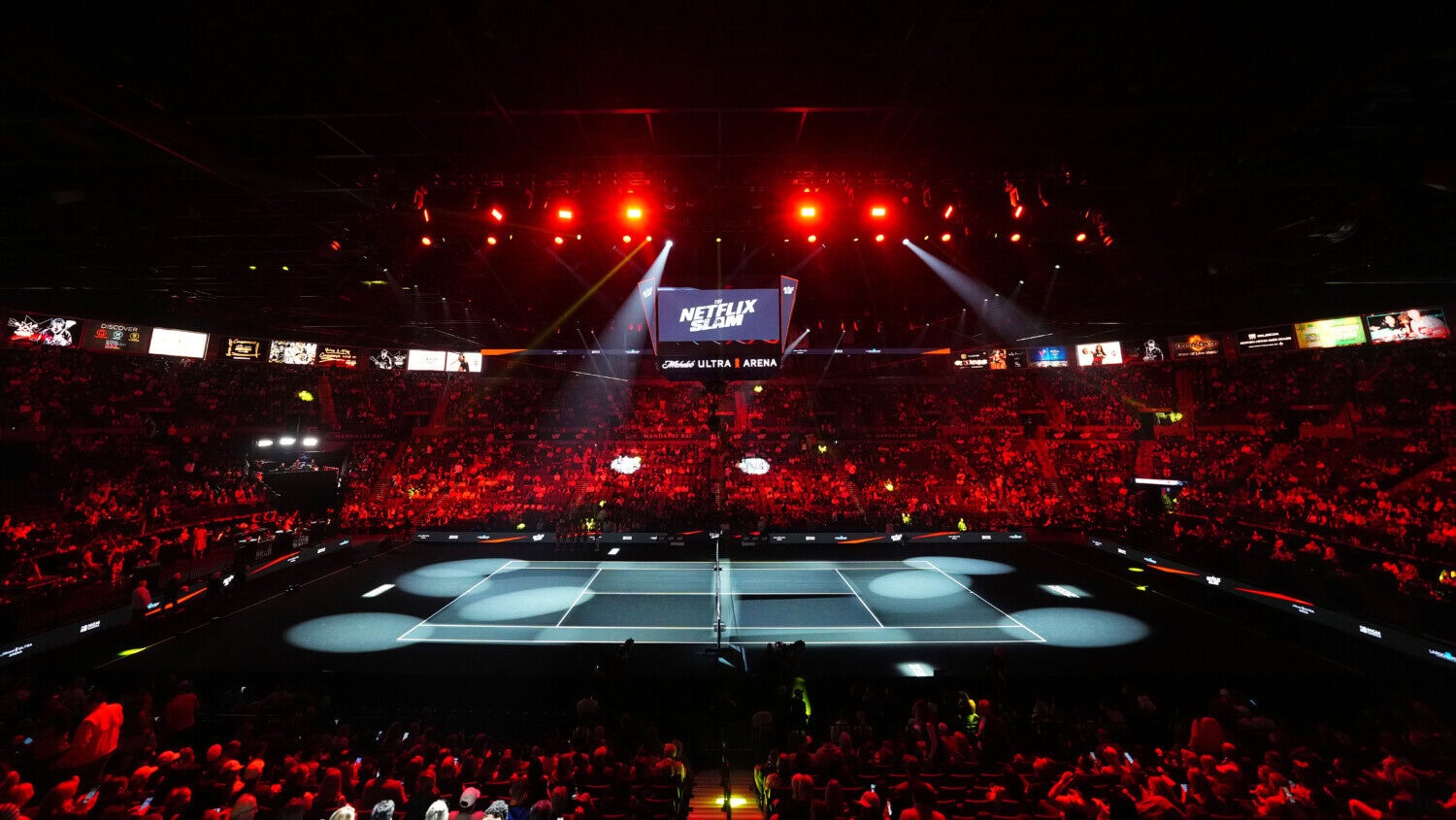The new year is off to a great start, and I’m already checking things off my bucket list. I’m heading to my first CES in Las Vegas for an exciting opportunity and interview, which I’ll share in Tech Talk next week.
Let’s dive into the first edition of the year!
A peek into today’s edition:
- Tech trends to watch in 2025
- Tech Byte: Game Boy radio
- States implement AI laws
The Future of Tech in 2025: Key Trends Shaping Entertainment, Sports, and AI
My favorite tagline when describing my work is “tech touches everything.” The tech industry has taught me that it’s an unpredictable space, but one thing is certain — these five key trends will redefine how we consume content, interact with technology, and experience entertainment in 2025 and beyond.
Let’s take a look at what I’ll be keeping an eye on this year.
The Streaming Services War Will Heat Up
The streaming service war is set to intensify in 2025 as platforms vie for dominance in an increasingly crowded market. With new players entering the space and existing services expanding their content libraries, competition will be fierce. The battle for subscribers will be more about delivering value and creating immersive experiences than ever before.
One of the key factors driving this intensification will be the rise of live sports and exclusive events. Services like Netflix, Peacock, Amazon Prime Video, and Apple TV+ have already made significant moves into sports broadcasting, and in 2025, we can expect even more aggressive strategies in this space. As streaming platforms secure exclusive broadcasting rights for major sports leagues, they’ll tap into a wider and more engaged audience, positioning themselves as essential subscriptions for sports fans.

It’s not just about sports — entertainment and music content will play a major role, too. Artists like The Weeknd and RAYE have already started experimenting with exclusive content on streaming platforms, a trend set to grow in 2025. Both artists released exclusive musical experiences for Apple Vision Pro, highlighting how live concerts, documentaries, and behind-the-scenes content are becoming key offerings. Streaming services will leverage these to create exclusivity and deepen fan engagement, further blurring the lines between traditional media and streaming.
AI Will Have a Bigger Impact on Music and Entertainment
AI‘s influence on the music and entertainment industries is set to deepen significantly in 2025, particularly through AI-powered content creation. I’m going to predict that we’ll see a lot more AI-powered productions across both industries and new partnerships are already giving a glimpse into that. Stars Collective, a film group that connects producers and directors, recently announced a partnership with LA-based tech agency HashMatrix to produce AI-generated projects and host a new AI film festival in LA this year. Stars Collective and HashMatrix will produce 12 short-form dramas. This new deal comes after the annual Tribeca Festival screened AI-generated short films for the first time, marking a new era for advanced tech.
The AI film boom will mainly target the film industry in Hollywood, which has been more reluctant to accept the new tech becoming more prevalent in films. Following the conclusion of the 2023 strikes, both the Writers Guild of America (WGA) and SAG-AFTRA addressed AI’s impact, with the WGA prohibiting AI training on covered material and SAG-AFTRA ensuring actors’ likenesses and performances are protected.
Despite the pushback, AI’s impact on the film industry is inevitable. It will be interesting to see how AI is recognized at film awards. It may take some time before AI-specific categories appear at the Golden Globes, Primetime Emmys, or Oscars, but they seem inevitable in the future.
In music, we’ll likely see a major uptick in AI-generated songwriting, voice replicas, and production. This could be a good thing for independent artists and new artists trying to get their start in music off the ground, reshaping the creative process as a whole. I recently spoke to Harvey Mason Jr., CEO of The Recording Academy, and Kathleen Grace, Chief Creative Officer at Vermillio, about how AI is reshaping the music industry. I definitely think we’ll continue to see pushback from music labels and more legal actions as the industry tries to figure out how AI will fit into music creation and distribution, especially with copyright in play.
Elsewhere, I think AI tech will empower creators on platforms like TikTok and YouTube to produce content without the need for production teams. While this raises concerns about authenticity and job displacement, it also opens the door for a new era of creativity.
There Will Be More Tech-Enabled Viewing Experiences Across Sports
I believe the tech world will continue to merge with sports, ultimately unlocking the potential to revolutionize how fans experience their favorite games, matches, and events. I wrote a detailed newsletter about the rise of tech-enabled sports viewing, a trend I anticipate will gain significant momentum in 2025. One standout opportunity lies with Cosm, an immersive tech, media, and entertainment company, as it expands its LED dome-like venues into new markets. Cosm has official locations in LA and Dallas, but the company also builds Experience Centers, or prototypes, for future venues in select cities. Cosm has established official partnerships with several major sports leagues and broadcasters, including the NBA, NFL, and NBC Sports.

VR headset makers and streaming platforms are also staking their claim in this rapidly evolving landscape. Meta‘s Xtadium app on Meta Quest delivers live and on-demand sports via virtual reality. Fans can watch NBA and WNBA games, UFC Fight Pass events, tennis matches, motorsports, soccer, and more. Additionally, Meta is expanding college sports and other athletic content on Quest devices through a collaboration with ESPN.
Meanwhile, platforms like Peacock saw a significant surge in subscribers in 2024, driven by an increase in sports streaming. This growth was largely fueled by Peacock’s coverage of the 2024 Summer Olympics, which introduced innovative AI features, including personalized recaps powered by AI. As streaming platforms like Netflix, Paramount+, YouTube TV, and Tubi expand into live sports, I think they’ll draw inspiration from Peacock by incorporating AI-powered features and other innovative tech enhancements.
Generative AI Will Get a New Identity
As it stands, AI chatbots like OpenAI’s ChatGPT and Google’s Gemini have been the faces of generative AI, but I think that will change this year. Generative AI is poised to evolve beyond text-based chatbots and become more embedded in everyday tools and platforms. Now, I don’t think the chatbots are going anywhere, but I do think we’ll see generative AI’s potential expand exponentially in 2025.
We’re already seeing early signs of this shift with AI being integrated into creative software, most notably across video and image generators. OpenAI has officially launched its AI video generator, Sora, while Adobe Firefly, a generative AI tool for creating images, text effects, and designs, is currently in beta for Adobe Creative Cloud users. Will AI video generators take over the generative AI space this year? Maybe. I could also see generative AI taking shape in classrooms as educators figure out how to implement the tech more.
We Will See More Investment in Content Creators
As platforms like TikTok, YouTube, and Instagram continue to dominate, the lines between traditional media and user-generated content are blurring, prompting major industry players to collaborate with influencers and creators to keep driving audiences to their platforms. In sports, we consistently see athletes leveraging social media platforms to build personal brands, engage with fans directly, and even monetize their content through sponsorships and partnerships. Similarly, in entertainment and music, creators are not just promoting products — they’re shaping narratives, launching viral trends, and even influencing the creative direction of projects.
In 2025, I expect the sports, entertainment, and music industries to increase their investments in content creators, recognizing their growing influence and ability to engage audiences in new, authentic ways. During the press trips I attended across these industries last year, I was intrigued by how deeply content creators are embedded in the experiences, with some even receiving the same access as the press. Content creators have become integral to these industries, driving trends, shaping fan experiences, and amplifying brand messaging.
As these industries recognize the power of creators to reach younger, more diverse audiences, we can expect even more strategic partnerships and investments aimed at harnessing their influence in 2025 and beyond.
Much of this could change depending on TikTok’s fate in the US, but we’ll circle back on that as the legal battle unfolds.
Tech Byte
Orange FM, a custom Game Boy cartridge maker, created a cartridge that allows Game Boy users to broadcast FM radio feeds. The cartridge transforms Game Boys into stereo systems with familiar features like digital tuning and presets.
This Week in Tech
- California and Illinois kicked off the new year with new laws regulating AI, prioritizing privacy and ethical safeguards. These measures target AI-generated content, enforce consent for replicating performers’ voices and likenesses, and strengthen protections against misuse.
- OpenAI published a blog post detailing its plans to convert from a for-profit entity into a Delaware public benefit corporation. The AI leader is transitioning its business to raise substantial capital more effectively while maintaining a nonprofit arm.
- President-elect Donald Trump filed a brief with the US Supreme Court to delay the Jan. 19 deadline for TikTok‘s divestiture or ban, aiming to allow his incoming administration to negotiate a different resolution. The high court is already scheduled to hear arguments on Jan. 10 regarding the app’s future in the US.
- The US isn’t the only country TikTok is facing troubles in. Venezuela‘s Supreme Court fined TikTok $10 million for failing to prevent viral video challenges that allegedly led to the deaths of three children. The court also ordered TikTok to establish an office in Venezuela to ensure compliance with local laws.
- On Dec. 27, a Waymo robotaxi collided with a Serve Robotics delivery robot at a West Hollywood intersection, with the Waymo vehicle braking hard but still making contact at four mph as the bot entered its lane. Neither autonomous vehicle sustained damage, and while liability remains unclear, a Waymo spokesperson said the vehicle registered the delivery bot as an inanimate object and kept driving.
Michelai’s Bet of the Week
Apple made its streaming service Apple TV+ free this weekend as part of a promotional campaign to attract new viewers and encourage subscriptions. I’m going to bet that other streamers will follow suit, offering similar free weekends or special promotions to compete for attention and boost their subscriber numbers.